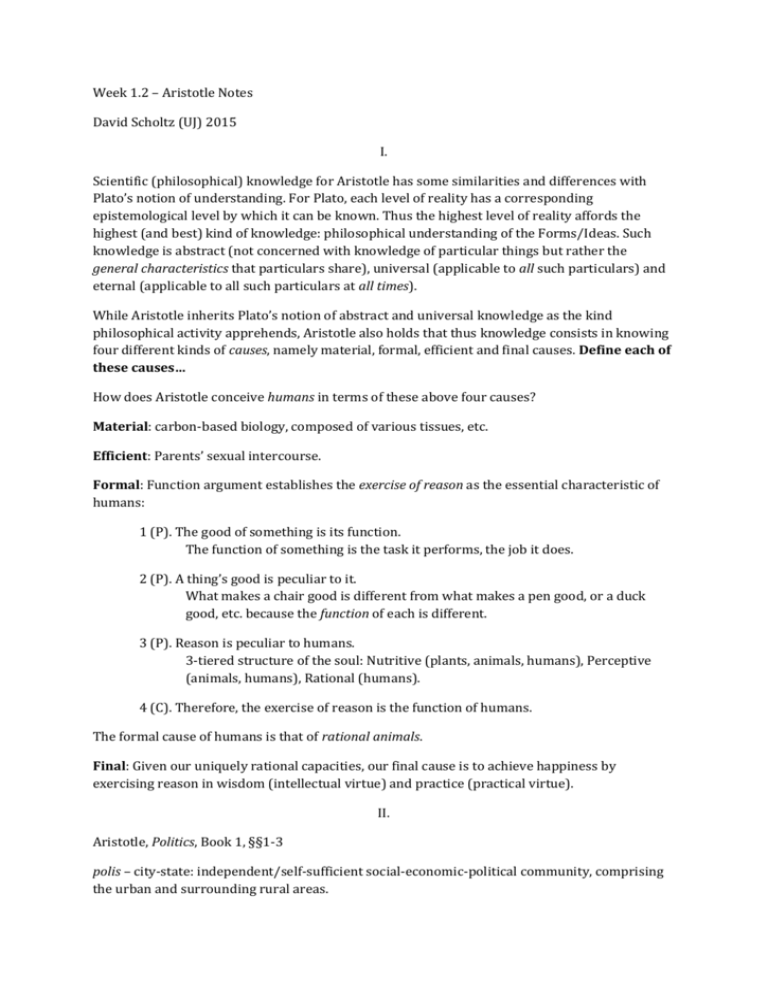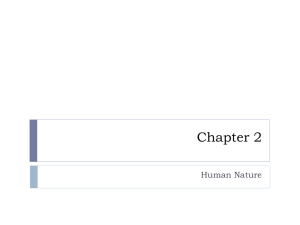Week 1.2 – Aristotle Notes
advertisement

Week 1.2 – Aristotle Notes David Scholtz (UJ) 2015 I. Scientific (philosophical) knowledge for Aristotle has some similarities and differences with Plato’s notion of understanding. For Plato, each level of reality has a corresponding epistemological level by which it can be known. Thus the highest level of reality affords the highest (and best) kind of knowledge: philosophical understanding of the Forms/Ideas. Such knowledge is abstract (not concerned with knowledge of particular things but rather the general characteristics that particulars share), universal (applicable to all such particulars) and eternal (applicable to all such particulars at all times). While Aristotle inherits Plato’s notion of abstract and universal knowledge as the kind philosophical activity apprehends, Aristotle also holds that thus knowledge consists in knowing four different kinds of causes, namely material, formal, efficient and final causes. Define each of these causes… How does Aristotle conceive humans in terms of these above four causes? Material: carbon-based biology, composed of various tissues, etc. Efficient: Parents’ sexual intercourse. Formal: Function argument establishes the exercise of reason as the essential characteristic of humans: 1 (P). The good of something is its function. The function of something is the task it performs, the job it does. 2 (P). A thing’s good is peculiar to it. What makes a chair good is different from what makes a pen good, or a duck good, etc. because the function of each is different. 3 (P). Reason is peculiar to humans. 3-tiered structure of the soul: Nutritive (plants, animals, humans), Perceptive (animals, humans), Rational (humans). 4 (C). Therefore, the exercise of reason is the function of humans. The formal cause of humans is that of rational animals. Final: Given our uniquely rational capacities, our final cause is to achieve happiness by exercising reason in wisdom (intellectual virtue) and practice (practical virtue). II. Aristotle, Politics, Book 1, §§1-3 polis – city-state: independent/self-sufficient social-economic-political community, comprising the urban and surrounding rural areas. koinonia – communion/community/association: have a share and participation in goods and activities of the community, a collective/fellowship with shared or similar interests/goals, cooperative activities. Aristotle distinguishes between various kinds of koinonia, each being established by their characteristic relationships between the members of an association. The polis (state) is the highest/best kind of koinonia. This is for several reasons, the most important of which is that the state includes all other kinds of human koinonia. What are the other kinds of koinonia and how do they comprise the state? The individual human (not a koinonia), apart from any relationships with others, still has the formal cause of a rational animal. The two most basic kinds of koinonia are those brought about by the relations between (1) male and female , which is a relationship of procreation, and (2) ruler and subject (master and slave or manager and labourer), which is a relationship of mutual preservation. The FAMILY is established by nature (the efficient cause) for the supply of men’s everyday wants (the final cause). The family is ruled by the male (for reasons Aristotle gives later on). The VILLAGE is comprised of several families for “more than the supply of daily needs” (what could these be?). The village is ruled by the eldest who is given the reign of a king/chief. The STATE is comprised of several villages for the purpose of pursuing the good life. It is only in the state (the largest community) can one fully exercise one’s rational capacity as an individual. When several villages are united in a single complete community [koinonia], large enough to be nearly or quite self-sufficing, the state [polis] comes into existence, originating in the bare needs of life, and continuing in existence for the sake of a good life. And therefore, if the earlier forms of society are natural, so is the state, for it is the end of them, and the nature of a thing is its end. Politics, Book 1, §2 The nature of man is rationality, and the end/telos of rationality the koinonia of the polis. Therefore, it is part of man’s nature to be political, to live within the state. “Hence it is evident that the state is a creation of nature, and that man is by nature a political animal” (Politics, Book 1, §2). Not only is the state a creation of nature (as opposed to an artificial legal agreement as we’ll see other philosophers say), the state is also prior or before the individual. What does Aristotle mean by this? Obviously the whole (state) cannot exist without its parts (individuals) in the same way a dog cannot exist without its legs, fur, ears, teeth, etc. Aristotle’s point is that the parts of the state (the individual members) are not self-sufficient, and if you remove the selfsufficient whole then there will not be any individual members. The telos of humas is to exist within the state, so if the state is removed then humans have no telos and therefore no function. Further, the state is by nature clearly prior to the family and to the individual, since the whole is of necessity prior to the part…[T]he proof that the state is a creation of nature and prior to the individual is that the individual, when isolated, is not self-sufficing; and therefore he is like a part in relation to the whole. Politics, Book 1, §2







